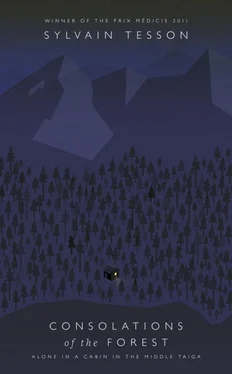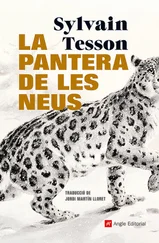It’s −27°F. The truck has dissolved into the fog. Silence falls from the sky in little white shavings. To be alone is to hear silence. A blast of wind; sleet muddles the view. I let out a scream. I open my arms, raise my face to the icy emptiness, and go back inside where it’s warm.
I’m poised on the gangway.
I will finally find out if I have an inner life.
15 FEBRUARY
My first evening on my own. In the beginning, I don’t dare move around much, anaesthetized by the perspective of the days ahead. At ten o’clock, explosions shatter the stillness. The air has warmed up to 10°F, and the sky looks like snow. The cabin couldn’t shake any harder if Russian artillery were pounding the lake. I step outside into the mild flakes to listen to the staggering blows. Currents are heaving at the lake ice.
Imprisoned, the water pleads for release. Setting a screen between life and the stars, the ice separates creatures from the sky: fish, seaweed, micro-organisms, marine mammals, arthropods.
The cabin measures ten feet by ten feet. Heat is supplied by a cast-iron stove, which will become my friend. I put up with the snoring of this particular companion. The stove is the axis of the world, around which everything is organized. It’s a little god with its own life, and when I offer it wood, I honour Homo erectus , who mastered fire. In his The Psychoanalysis of Fire , Gaston Bachelard imagines that the idea of rubbing two sticks to kindle a spark was inspired by the frictions of love. While fucking, man intuited the creation of fire. Nice to know. To dampen the libido, remember to stare at dying embers.
I have two windows. One looks southward, the other to the east. Through the latter I see, some sixty miles away, the snowy crests of Buryatia, an autonomous republic within the Russian Federation, while through the other window I can trace, behind the branches of a fallen pine, the line of the bay as it curves away to the south.
My table, set right up against the eastern window, occupies its entire width, in the Russian fashion. Slavs can sit for hours watching raindrops on window panes. Once in a while they get up, invade a country, have a revolution and then go back to dreaming at their windows in overheated rooms. In the winter they sip tea interminably, in no hurry to go outside.
16 FEBRUARY
At noon, outdoors.
The sky has powdered the taiga, shaking velvety down over the vert-de-bronze of the cedars. Winter forest: a silvery fur tossed onto the shoulders of the terrain. Waves of vegetation cover the slopes. This desire of the trees to invade everything. The forest, an ocean swell in slow motion. At every fold in the relief, black streaks darken the egg-white crowns of the trees.
How can people adore abstract fancies more than the beauty of snow crystals?
17 FEBRUARY
This morning the sun hoisted itself over the peaks of Buryatia at 8.17. A sunbeam came through the window, striking the logs of the cabin. I was in my sleeping bag. I thought the wood was bleeding.
The last flickers in the stove die at around four a.m. and by dawn, the room is freezing. I have to rise and light the fire: two actions that celebrate the passage from hominid to man. I begin my day by blowing on embers, after which I go back to bed until the cabin has reached the temperature of a new-laid egg.
This morning I grease the weapon Sergei left with me, a signal flare pistol like the one used by sailors in distress. The barrel launches a blinding charge of phosphorus to squelch the ardours of a bear or an intruder.
I have no gun and will not be hunting. To begin with, hunting is not allowed in the nature reserve. Secondly, I would consider it a dirty trick to shoot down the living creatures of these woods in which I am a guest. Do you like it when strangers attack you? It doesn’t bother me that creatures more noble, better made and far more muscular than I roam freely in the open forest.
This place isn’t the Forêt de Chantilly. When poachers run into the gamekeepers, guns are drawn. Sergei never patrols without his rifle. Along the shores of the lake lie tombs bearing the names of rangers: a simple cement stele decorated with plastic flowers and every so often, the guy’s photo engraved on a metal medallion. As for the poachers, they have no graves.
I think about what happens to minks. Being born in the forest, surviving the winters, falling into a trap – and winding up as coats for old hags who wouldn’t last three minutes out in the taiga. If at least they were as graceful as the mustelids that are skinned for them… Sergei told me a story. The governor of the Irkutsk region was hunting bears from his helicopter in the mountains overlooking Baikal. Destabilized by the wind, the Mi-8 crashed. Tableau de chasse : eight dead. Sergei: ‘The bears must have danced a polka around the bonfire.’
My other weapon is a dagger made in Chechnya, a handsome knife with a wooden handle, which never leaves my side all day. In the evening, I stick it into the beam over my bed. Deeply enough so that it doesn’t fall down while I’m dreaming and slice open my belly.
18 FEBRUARY
I wanted to settle an old score with time. I had discovered that walking provided a way to slow it down. The alchemy of travel thickens seconds: those spent on the road passed less quickly than the others. Frantic with restlessness, I required fresh horizons and conceived a passionate interest in airports, where everything is an invitation to departure. I dreamed of ending up in a terminal. My trips began as escapes and finished in track races against the hours.
Two years ago, I chanced to spend three days in a tiny izba , a traditional Russian log cabin. A ranger, Anton, had welcomed me into his home on the eastern shore of Lake Baikal. Anton was so farsighted that, behind his glasses, his goggle-eyes gave him the look of a gleeful toad. At night we played chess, and during the day I helped him haul in the nets. We spoke hardly at all but we read a lot: for me, the ‘decadent’ nineteenth-century novelist Huysmans, and for him, Hemingway (which he pronounced ‘Rhaymingvayee’). He sloshed down gallons of tea; I went walking in the woods. Sunlight flooded the room. Geese were fleeing the autumn, and I thought about my dear ones. We listened to the radio. Whenever the female announcer reported the temperatures in Sochi, Anton would say: ‘It must be nice, down at the Black Sea.’ From time to time he’d toss a log into the stove, and at day’s end, he’d get out the chessboard. We’d sip at some Siberian vodka from Krasnoyarsk and push the pawns around: I was always white and often lost. The endless days passed quickly, and when I left my friend I thought, This is the life for me. All I had to do was ask of immobility what travel no longer brought me: peace.
That was when I promised myself I would live alone in a cabin for a few months. Cold, silence and solitude are conditions that tomorrow will become more valuable than gold. On an overpopulated, overheated and noisy planet, a forest cabin is an Eldorado. Over 900 miles to the south, China is humming with a billion and a half human beings running out of water, wood and space. Living in the forest next to the world’s largest reserve of fresh water is a luxury. One day, the Saudi oilmen, the Indian nouveaux riches and the Russian businessmen who drag their ennui around the marble halls of palaces will understand this. Then it will be time to go a step up in latitude to the tundra. Happiness will lie beyond the 60th parallel north.
Better to live joyfully in a wilderness clearing than languish in a city. In the sixth volume of The Earth and Its Inhabitants , the geographer Élisée Reclus – a master anarchist and antiquated stylist – proposes a superb idea. The future of humanity would lie in ‘the complete union of the civilized with the savage’. There would be no need to choose between our hunger for technological progress and our thirst for unspoilt places. Life in the forest offers an ideal terrain for this reconciliation between the archaic and the futuristic. An eternal existence unfolds beneath the treetops, literally at one with the Earth. There we can reconnect with the truth of moonlit nights, submitting to the doctrine of the forests without renouncing the benefits of modernity. My cabin shelters the happy union of progress and the past. Before I came here, I selected from the department store of civilization a few products indispensable to happiness: books, cigars, vodka, and I will enjoy them in the rugged surroundings of the woods. I followed the intuitions of Reclus so faithfully that I’ve equipped my home with solar panels, which run a small computer. The silicon of my integrated circuits feeds on photons. I listen to Schubert while watching the snow, I read Marcus Aurelius after my wood-chopping chores, I smoke a Havana to celebrate the evening’s fishing. Reclus would be pleased.
Читать дальше












